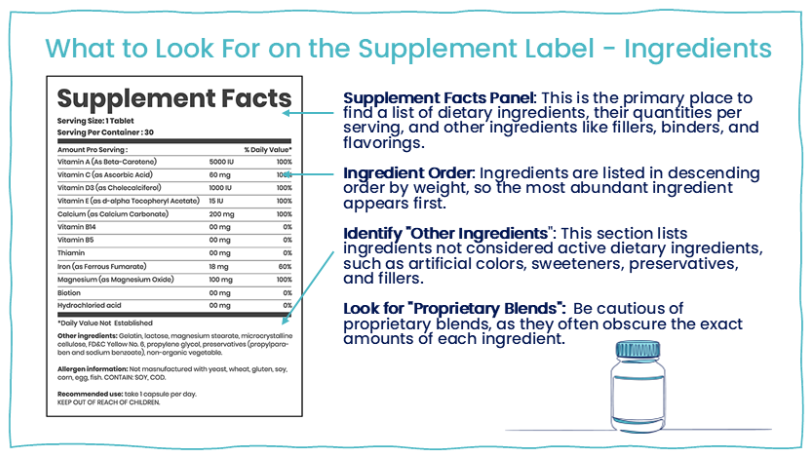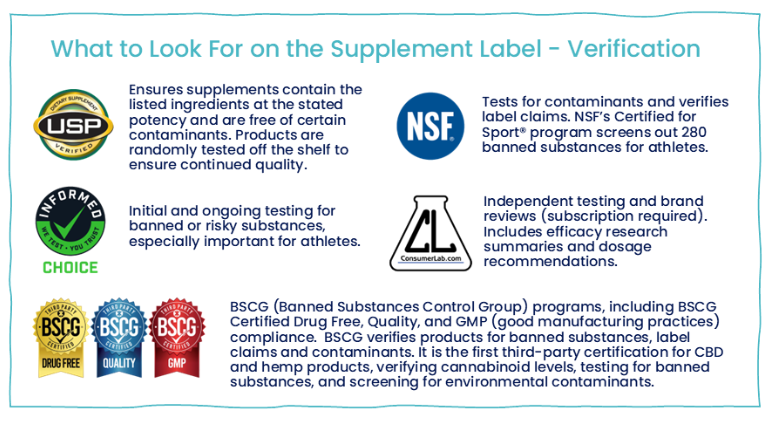
Hype, Hope, and How to Tell What Works
Walk into any pharmacy, scroll through TikTok, or wander the vitamin aisle, and you’ll be hit with big promises in tiny bottles. More energy! Better sleep! Shiny hair, glowing skin, stronger joints! With supplements, the marketing is loud, but the science is often a whisper and regulation is virtually nonexistent.
These are the reasons that we have steered clear of recommending supplements in this space. But sexy supplement claims are being covered by news organizations and supplement hype is rampant on social media, spread by influencers who are often paid to endorse products. And some supplements are beneficial to some people. So, instead of pretending supplements don’t exist, we’ve decided to arm you with the facts you need to figure out if you should actually take one, and if the one you’re buying has what it says it has inside the bottle.
Let’s break it down.
Do You Even Need a Supplement?
Supplements aren’t magic shortcuts (sorry!). They’re meant to supplement your diet, not replace it. If your medical provider says you’re low in vitamin D, iron, or another nutrient, a supplement might help. If you’re thinking about a trendy mushroom powder because your coworker swears it makes her “so focused,” you may just be paying for expensive fairy dust.
The smart move: start with food. Whole foods give you vitamins, minerals, fiber, and compounds that pills can’t replicate. Supplements should fill genuine gaps—not be a shortcut because kale is too bitter and chewy.
TikTok vs. Science
On social media, the word “research” often means “I saw one influencer’s post while standing in line at Starbucks and thought I’d try it.” Actual science looks a lot different. Credible evidence comes from large, controlled studies published in peer-reviewed journals, not from someone’s cousin’s success story.
Often, especially on slow news days (remember those?), new, unsupported claims about supplement health benefits find their way into the headlines (Remember when wine was supposed to be good for you?). No one wants to have spent months or years on research that adds nothing to the science, and sometimes the titles researchers attach to research papers highlight results that don’t stand up to close scrutiny. The health benefits of the resveratrol in red wine is one example of overstated results. You’d have to drink a ton of red wine to benefit from the anti-inflammatory and anti-aging properties of resveratrol. If you regularly drank that much wine, the risks to your health (particularly your liver) would far outweigh the anti-inflammatory and anti-aging benefits.
So, before you decide on a supplement, ask:
- Has this supplement been studied in real people, not just mice?
- Was it one small study or many, done by independent researchers? Sometimes research is funded by the maker of a supplement. That research is decidedly not independent.
- Did the results actually matter, or were they just statistically interesting?
To find the answers, there are a couple of easy places to look. First, the National Institutes of Health (NIH) has a database of fact sheets on more than one hundred different supplements. These will give you a review of the existing research.
If you’d prefer to do your own review, you can look up the original studies on a search engine called PubMed, also run by the NIH. Consumer Lab, a verification organization (see “Verification” chart below), also provides information on efficacy, best brands, and dosing.
Checking the Labels
Once you decide to try a supplement, you’ll be faced with dozens of purchase options. Making the best decision starts with a close look at the label.

The Ingredient List Isn’t the Whole Story
Even if a supplement should work, the next question is: does the bottle actually contain what it claims? The supplement industry is largely unregulated, and companies don’t have to prove their product works, or even that the label matches what’s inside, before selling it.
That’s why researchers have found melatonin gummies with triple the listed dose, and “herbal blends” spiked with undeclared drugs. Not exactly the wellness boost you were promised.
Verification Organizations and Symbols
Here’s where third-party testing comes in. Independent groups test products to see if what’s on the label matches what’s in the bottle, and if anything dangerous is lurking.
If you see these seals, it’s a sign someone outside the company is keeping them honest.

The Bottom Line
Supplements can be helpful in certain situations, but don’t let clever marketing or social media hype make your health decisions. Pro tip: If the ad sounds too good to be true, it usually is. Stick to evidence, look for verification seals, and when in doubt, ask a professional, especially if you regularly take medication. There are ingredients in supplements that can interact dangerously with prescription drugs.